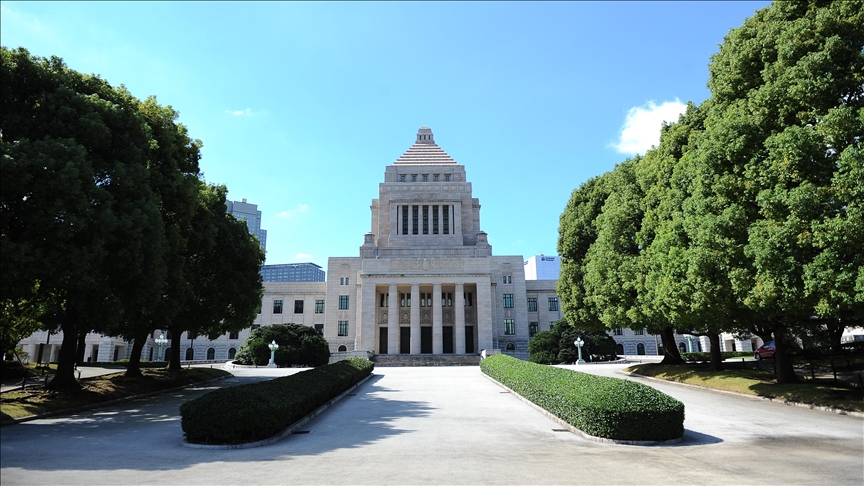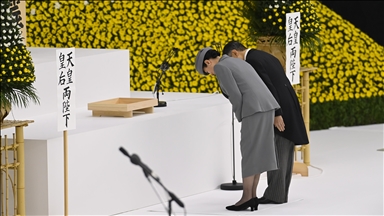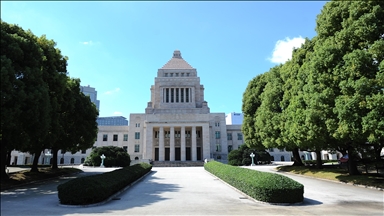Japan enters ‘most interesting time for politics’ as race for new prime minister heats up
Newly elected LDP chief Sanae Takaichi, Japan’s first woman to lead the party, struggles to secure a parliamentary majority
 Japan Parliament, Tokyo, Japan
Japan Parliament, Tokyo, Japan
- Newly elected LDP chief Sanae Takaichi, Japan’s first woman to lead the party, struggles to secure a parliamentary majority
- Longtime ruling LDP seeks new coalition after ‘Party of Peace’ quits over hawkish shift
- Opposition parties seek to unite behind single candidate, but analysts say its an ‘uphill battle’
ISTANBUL
Japan, long known for its political stability, is experiencing one of its most turbulent moments in decades as the country prepares to elect a new prime minister following Shigeru Ishiba’s surprise resignation last month.
The leadership race has plunged Japanese politics into rare turbulence, with the ruling Liberal Democratic Party (LDP) scrambling to rebuild its coalition and opposition parties seeking to seize the moment. Analysts say the outcome could reshape Japan’s political landscape and determine how the world’s fifth-largest economy navigates growing domestic and global challenges.
Hiromi Murakami, an associate professor at Temple University’s Japan Campus, described the situation as “the most interesting time for Japanese politics,” noting that the balance of power could shift depending on whether the LDP secures new allies or faces a united opposition.
LDP and its first female leader seek new coalition
Japan’s parliament will vote for a new prime minister on Oct. 21, after Ishiba’s Sept. 7 resignation in the wake of the coalition’s poor showing in July’s Upper House elections.
The contest, originally slated for 2027, has set off intense maneuvering among parties as the LDP’s newly elected leader Sanae Takaichi seeks to form a governing coalition capable of commanding a majority in parliament.
Takaichi, 64, a longtime conservative lawmaker known for her nationalist views and close ties with former Prime Minister Shinzo Abe, now faces the immediate task of securing enough support to become Japan’s next prime minister.
She made history as the first woman to lead the LDP, but her path to power is uncertain. Shortly after her election, the party’s junior coalition partner, Komeito, announced its withdrawal from the decades-long alliance, leaving the LDP short of a majority.
In the 465-member lower house, the LDP holds 196 seats, while 233 are needed to elect a prime minister. Talks are under way with the conservative Japan Innovation Party (Ishin), which holds 35 seats, but even a deal with Ishin would still fall short.
“The LDP must have both Ishin and the DPP (Democratic Party for the People) as coalition partners,” Kazuto Suzuki, a political scientist and professor at the University of Tokyo, told Anadolu.
Even so, Takaichi would lead a fragile minority, making a snap election almost “unavoidable,” he added.
End of 26-year alliance
The collapse of the coalition between the LDP and Komeito marks the end of one of Japan’s most enduring political partnerships.
Komeito, the political arm of the Buddhist organization Soka Gakkai, had signaled its discomfort with Takaichi’s leadership ahead of the LDP vote. The party, which calls itself the “Party of Peace,” has long advocated moderation in foreign policy and dialogue with neighbors such as China – positions that contrast sharply with Takaichi’s hawkish stance.
The break also reflected growing frustration over the LDP’s handling of a political funding scandal that hurt both parties. Komeito wanted stronger accountability and clear rules to prevent a repeat of the scandal, said Murakami. But the LDP treated the leadership vote as a form of public approval to move on.
Komeito’s base of elderly Soka Gakkai supporters has also been shrinking, making the party more cautious about continuing conflicting alliances that alienate voters.
Opposition faces uphill battle
Opposition parties, meanwhile, are scrambling to unite behind a single candidate – a difficult task given policy divisions.
Among possible contenders is Yuichiro Tamaki, leader of the DPP, which holds 148 seats, but disagreements with the Constitutional Democratic Party (CDP) over defense policy among others have stalled progress.
However, it would allow the country to elect a non-LDP prime minister for the first time since 2012.
Murakami said it is a rare opportunity for the non-LDP parties, but it depends on whether they can truly unite.
Combined, the CDP, Ishin, DPP and Komeito would command a razor-thin majority of 234 seats – only possible if Ishin does not join the LDP coalition.
“There is a little possibility that the opposition will unify their candidate,” Suzuki told Anadolu. “If the opposition wants to elect a non-LDP Prime Minister, it would have an uphill battle.”
Indeed, as of Wednesday, the opposition parties were yet to announce a candidate they would endorse jointly despite holding two consecutive meetings on the issue on Tuesday and Wednesday.
Takaichi’s challenge
If elected, Takaichi would become Japan’s first female prime minister, a milestone that could redefine perceptions of leadership in a country where politics remains overwhelmingly male-dominated.
Yet her policies may prove divisive. A firm supporter of revising Japan’s pacifist constitution, she has pushed for expanding defense spending and taking a tougher line on China and North Korea. Her critics fear such positions could heighten regional tensions.
Analysts say her first challenge will be consolidating power at home.
Murakami said that if Takaichi wants to call a snap election, as the media reports, the timing is not ideal.
“If she wants to do it, she wants to do quickly, because that's the most popular time right after she's elected … the more time that she waits, it's not favorable for her,” she said.
However, a busy schedule for the rest of the year – including passing a budget, the ASEAN summit in Kuala Lumpur and a visit by US President Donald Trump – could get in the way.
Murakami said Takaichi must also address public frustration over economic stagnation, rising prices and political scandals.
“If LDP wants to survive, they have to change something,” said Murakami. “If they don’t adjust, then other parties will.”
Anadolu Agency website contains only a portion of the news stories offered to subscribers in the AA News Broadcasting System (HAS), and in summarized form. Please contact us for subscription options.







